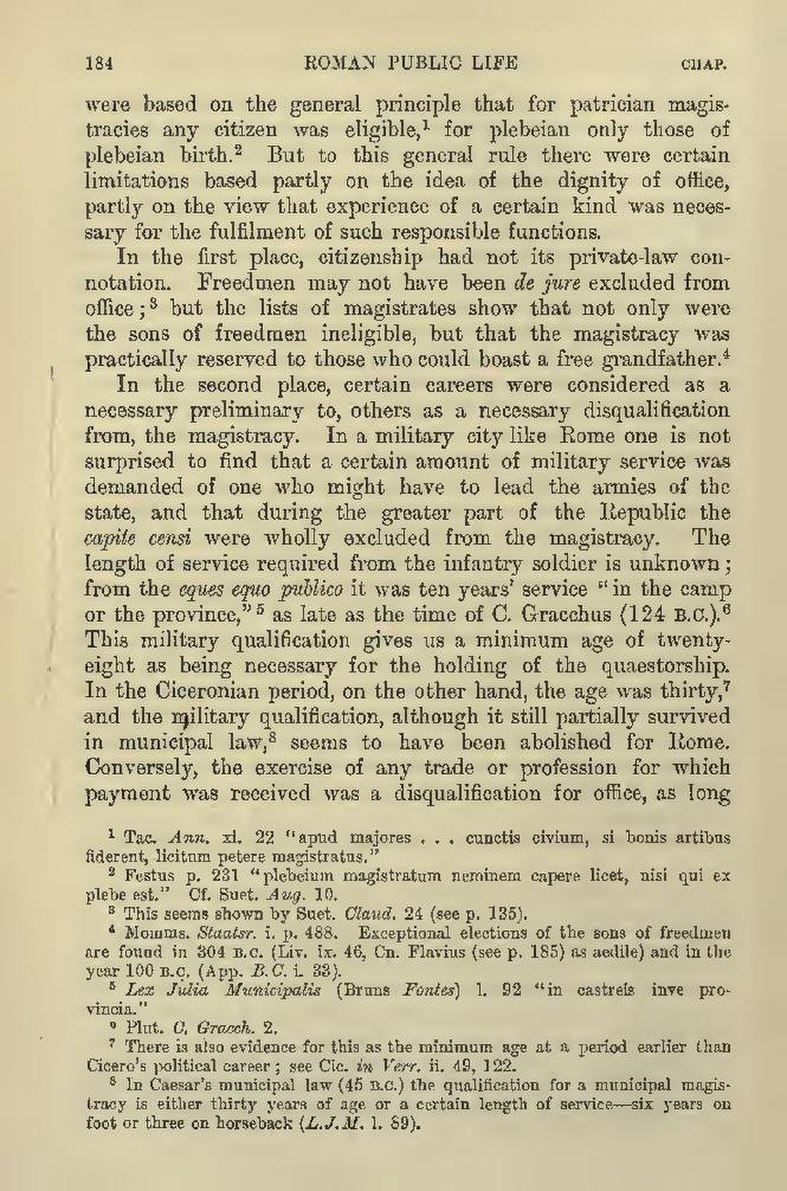were based on the general principle that for patrician magistracies any citizen was eligible,[1] for plebeian only those of plebeian birth.[2] But to this general rule there were certain limitations based partly on the idea of the dignity of office, partly on the view that experience of a certain kind was necessary for the fulfilment of such responsible functions.
In the first place, citizenship had not its private-law connotation. Freedmen may not have been de jure excluded from office;[3] but the lists of magistrates show that not only were the sons of freedmen ineligible, but that the magistracy was practically reserved to those who could boast a free grandfather.[4]
In the second place, certain careers were considered as a necessary preliminary to, others as a necessary disqualification from, the magistracy. In a military city like Rome one is not surprised to find that a certain amount of military service was demanded of one who might have to lead the armies of the state, and that during the greater part of the Republic the capite censi were wholly excluded from the magistracy. The length of service required from the infantry soldier is unknown; from the eques equo publico it was ten years' service "in the camp or the province,"[5] as late as the time of C. Gracchus (124 B.C.).[6] This military qualification gives us a minimum age of twenty-eight as being necessary for the holding of the quaestorship. In the Ciceronian period, on the other hand, the age was thirty,[7] and the military qualification, although it still partially survived in municipal law,[8] seems to have been abolished for Rome. Conversely, the exercise of any trade or profession for which payment was received was a disqualification for office, as long
- ↑ Tac. Ann. xi. 22 "apud majores . . . cunctis civium, si bonis artibus fiderent, licitum petere magistratus."
- ↑ Festus p. 231 "plebeium magistratum neminem capere licet, nisi qui ex plebe est." Cf. Suet. Aug. 10.
- ↑ This seems shown by Suet. Claud. 24 (see p. 135).
- ↑ Momms. Staatsr. i. p. 488. Exceptional elections of the sons of freedmen are found in 304 B.C. (Liv. ix. 46, Cn. Flavius (see p. 185) as aedile) and in the year 100 B.C. (App. B.C. i. 33).
- ↑ Lex Julia Municipalis (Bruns Fontes) l. 92 "in castreis inve provincia."
- ↑ Plut. C. Gracch. 2.
- ↑ There is also evidence for this as the minimum age at a period earlier than Cicero's political career; see Cic. in Verr. ii. 49, 122.
- ↑ In Caesar's municipal law (45 B.C.) the qualification for a municipal magistracy is either thirty years of age or a certain length of service—six years on foot or three on horseback (L.J.M. l. 89).
